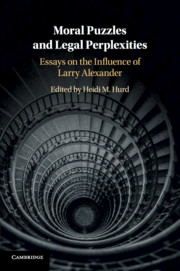Book contents
- Moral Puzzles and Legal Perplexities
- Moral Puzzles and Legal Perplexities
- Copyright page
- Dedication
- Contents
- Figures
- Contributors
- Acknowledgments
- 1 Introduction
- Part I Puzzles in Criminal Law
- Part II Problems in Constitutional Law
- Part III Perplexities in Jurisprudence
- Part IV Paradoxes in Moral Philosophy
- 19 Respect and Discrimination
- 20 The Means Principle and Optimific Wrongs
- 21 Deontology’s Travails
- 22 The Rationality of Threshold Deontology
- 23 Real-World Criminal Law and the Norm Against Punishing the Innocent
- 24 Conclusion
- Bibliography of Works by Larry Alexander
- Index
20 - The Means Principle and Optimific Wrongs
from Part IV - Paradoxes in Moral Philosophy
Published online by Cambridge University Press: 02 November 2018
- Moral Puzzles and Legal Perplexities
- Moral Puzzles and Legal Perplexities
- Copyright page
- Dedication
- Contents
- Figures
- Contributors
- Acknowledgments
- 1 Introduction
- Part I Puzzles in Criminal Law
- Part II Problems in Constitutional Law
- Part III Perplexities in Jurisprudence
- Part IV Paradoxes in Moral Philosophy
- 19 Respect and Discrimination
- 20 The Means Principle and Optimific Wrongs
- 21 Deontology’s Travails
- 22 The Rationality of Threshold Deontology
- 23 Real-World Criminal Law and the Norm Against Punishing the Innocent
- 24 Conclusion
- Bibliography of Works by Larry Alexander
- Index
Summary
- Type
- Chapter
- Information
- Moral Puzzles and Legal PerplexitiesEssays on the Influence of Larry Alexander, pp. 333 - 349Publisher: Cambridge University PressPrint publication year: 2018
- 1
- Cited by

